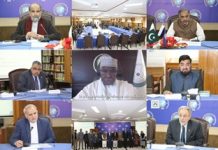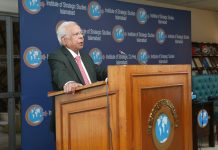Statement by Masood Khan, Director General, Institute of Strategic Studies Islamabad (ISSI), at the Open Consultations convened by the United Nations Security Council on the review of the status of the implementation of Resolution 1540.
June 21, 2016
Mr. Chairman,
I thank you for giving an opportunity to the Institute of Strategic Studies Islamabad (ISSI) to express it views on the review of the status of the implementation of UN Security Council Resolution 1540. We acknowledge Ambassador Roman Oyarzun’s dynamic leadership of the 1540 Committee and the solid and substantive contribution made by the Group of Experts led by Mr. Terence Taylor.
Resolution 1540, adopted under Chapter VII, is an important and integral part of non-proliferation regime. It is innovative, universal and mandatory. It has been the United Nations’ success story, as it has outperformed many treaty regimes. The resolution’s consistent implementation has developed a universal norm against proliferation and successfully influenced nations to develop legal and administrative frameworks to prevent and prohibit non-state actors’ activities to acquire nuclear, chemical and biological weapons. The secret of its success has been its lean structure, a light footprint, remarkable agility, a light footprint and extensive outreach.
Resolution 1540 needs rejuvenation and renovation.
It is evident that the system put in place by the 1540 Committee cannot be reformed and reviewed, nor renewed, in isolation. The threat posed by non-state actors is evolving; the nexus between terrorists and violent extremists is becoming stronger; there is growing episodic, and sometimes anecdotal, evidence of terrorists’ attempts to acquire weapons of mass destruction. Moreover, the breakthroughs in science and technology would make it easier to acquire drones and multiple devices of 3D printing and use of cyberspace. This exacerbates risks of malicious use and proliferation. It is important that an authentic study is commissioned to assess the severity and immediacy of the threat of nuclear and radiological terrorism.
To deal with the full spectrum of threats, the 1540 regime has to work closely with other entities and regimes, especially the Nuclear Security Summit process, the IAEA, Amended CPPNM, ICSANT, Global Partnership, and GICNT. Resolution 1540 cannot do it all nor do it alone; and yet its role will remain pivotal.
Resolution 1540 should upgrade and streamline its accounting, security and export control measures. Clearly the 1540 Committee’s matchmaking mechanism has not worked effectively. It makes eminent sense to establish a dedicated fund that could be used to finance assistance programmes offered by the relevant international organizations. This would enable the Committee to develop assistance projects in cooperation with international organizations, refine its database and build a clearing house for WMD threat posed by non-state actors. In this regard, cooperation with the regional organizations will become much more useful by creating a network of focal points, as Resolution 1977 calls for.
The diligence of the 1540 Committee and the Group of Experts in the areas of transparency and outreach has raised awareness about the myriad threats nations face and led to the submission of additional national implementation actions plans. Their direct interaction with member states also helps build capacity and expedite implementation. However, it is necessary to explore new ways to enhance such interaction, while adhering to the principles of national responsibility and voluntary consent.
Industry, civil society and academia are now key partners in promoting the 1540 process and preventing non-state actors’ access to dual use technologies. They should therefore be brought out of the margins and shadows and integrated into the mainstream.
While reviewing 1540 mechanism, we should not take steps that would inadvertently make it clunkier, because more bureaucracy would not mean more efficiency. Besides, the precise and pristine mandate of the resolution should not be loaded with matters that are being handled competently elsewhere. That said, a revamped resolution should not be oblivious or unresponsive to real time, emerging threats that are destabilizing large chunks of the globe. ISIS must not be allowed to lay its hands on radiological materials or chemical weapons.
Since 2004, Pakistan has elaborated and implemented a comprehensive export control regime. Our legislative, regulatory, administrative and enforcement measures are at par with the standards followed by the Nuclear Suppliers Group (NSG), the Missile Technology Control Regime (MTCR), the Australia Group and the European Union. Resolution 1540, under which we have submitted four reports, has been a catalyst in the refinement of our regime. Our emphasis all along has been on robust laws, comprehensive scope, catch all control, barriers against diversion, preparedness and response, and international cooperation. What is more, Pakistan’s Strategic Export Control Division is fully involving industry, academia and civil society to garner support for the implementation of its export control regime. Our commitment to the success of Resolution 1540 is second to none. Let me add that these credentials, among others, make Pakistan eminently eligible to become a member of the Nuclear Suppliers Group.
The Security Council’s new resolution should broaden and finesse the Committee’s mandate in the areas where there are clear gaps and deficits, especially in monitoring and assistance. A review should not hand down an empty, repetitive document.
It would be useful for the 1540 Committee to continue its outreach, dialogue, awareness raising, sharing of effective practices and cooperative posture with a wide array of stakeholders as it moves towards another review in five years. Such collaboration and consultations could play a major role in refining and revitalizing the 1540 regime.
I am submitting the full text of the statement to the Secretariat.
I thank you, Mr. Chairman













